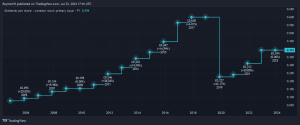A bachelor’s degree is often all you need to attain to earn a living and pay off student debt you picked up along the way. But for certain majors, you may need to level up to a master’s degree to ensure a greater payoff.
Here’s how to assess if a master’s degree will be worth it.
Should I get a master’s degree?
Earnings tend to correlate with how much schooling you have. For example, bachelor’s degree earners will earn a median of $2.27 million over their lifetimes, according to Georgetown University’s Center for Education and the Workforce, or CEW. By contrast, master’s degree holders earn a median of $2.67 million over their lifetimes.
It’s not always financially worth it to get a master’s degree: CEW data shows 40% of bachelor’s degree holders earn more than the median of workers with a master’s degree.
Certain master’s degree programs pay off better than others when it comes to lifetime earnings, CEW data shows:
-
For architecture and engineering majors, a master’s degree results in nearly a million-dollar lifetime earnings difference by median: $4.6 million with a master’s degree versus $3.8 million for a bachelor’s degree.
-
Communications and journalism majors see a negligible increase in lifetime earnings for a graduate degree: $2.9 million versus $2.7 million for a bachelor’s degree. There are similar outcomes for humanities and liberal arts majors ($2.4 million for a bachelor’s degree versus $2.8 million for a master’s degree).
-
Other majors don’t see a substantial payoff until the doctoral or professional degree level. Biology and life sciences, for example, have a $500,000 difference between having a bachelor’s degree ($2.8 million) versus a master’s degree ($3.3 million). But a professional degree boosts median earnings to $6.7 million. The same is the case for health care-related majors — a doctoral degree is worth $4.4 million versus $3.4 million for a master’s degree or $2.9 million for a bachelor’s degree.
Your actual income will depend on factors like your major, the school you attended, race and gender and where you live. Your income also doesn’t go as far with accumulated student loan debt.
Graduate school could be worthwhile even if it takes more debt
Deciding how far you need to go in your education depends on what you study. It’s a “game between specific and general,” says Anthony Carnavale, director and research professor at the Georgetown University Center on Education and the Workforce.
“One way to think of the game is, if I get a degree in the classics, that’s not going to make me a lot of money,” says Carnavale. “But then, you pick up in graduate school a law degree or something, so you get the specific education.”
Nearly two-thirds (61%) of graduates with a master’s degree will earn more than the median bachelor’s degree holder, according to the CEW. It’s even higher for doctoral (73%) and professional (83%) degree holders.
Having a higher degree could also strengthen your ability to stay employed during economic downturns. Nicole Smith, research professor and chief economist at the CEW, says, “When the economy is not doing so great, the ones with the lowest level of education are the ones that are kicked off the bus fastest.”
If you’ve taken on debt as most college students do, you may even need graduate school to repay your bachelor’s degree debt. It seems counterintuitive and even counterproductive to take on more debt. But depending on your major, a higher college degree could be necessary to boost your earnings. Still, other majors don’t require you to attain any degree higher than an associate or a bachelor’s degree for them to pay off.
What you study is a huge determining factor:
20 majors most likely to have a graduate degree
|
Share with graduate degree |
|
|---|---|
|
Biochemistry. |
|
|
Chemistry. |
|
|
Special education. |
|
|
Miscellaneous biological science. |
|
|
Philosophy. |
|
|
Miscellaneous physical sciences. |
|
|
Political science. |
|
|
Health services. |
|
|
Aerospace engineering. |
|
|
Mathematics. |
|
|
Foreign language. |
|
|
Psychology. |
|
|
Secondary education. |
|
|
Ethnic studies. |
|
|
Social services. |
|
|
Chemical engineering. |
Source: Federal Reserve Bank of New York “The Labor Market for Recent College Graduates” Updated: Feb. 12, 2021.
20 majors least likely to have a graduate degree
|
Share with graduate degree |
|
|---|---|
|
Construction services. |
|
|
Commercial art and graphic design. |
|
|
Marketing. |
|
|
Miscellaneous technologies. |
|
|
Advertising and public relations. |
|
|
Mass media. |
|
|
Agriculture. |
|
|
Criminal justice. |
|
|
Communications. |
|
|
Fine arts. |
|
|
Business management. |
|
|
General business. |
|
|
Information systems and management. |
|
|
Business analytics. |
|
|
Engineering technologies. |
|
|
Medical technicians. |
|
|
Journalism. |
|
|
Liberal arts. |
|
|
Accounting. |
Source: Federal Reserve Bank of New York “The Labor Market for Recent College Graduates” Updated: Feb. 12, 2021.
How to choose a master’s degree program
Not all master’s degree programs are equal. In many cases, the cost of attending an elite university may not be worth it when its prestige lies in its undergraduate program. But there are few consumer-friendly ways to compare programs.
The cost of master’s programs will be less expensive at public colleges than private ones. But some master’s degrees will cost more due to the length of the program.
Compare degree earnings with the cost of attendance. It would be best if you considered how much loan debt you’ll have to take on to complete your master’s degree above any undergraduate debt you already have.
The College Scorecard, a data tool from the U.S. Department of Education, does not include graduate-level data, including earnings outcomes by major among its degree program. But there are other resources to estimate costs, debt and earnings:
How to pay for a master’s degree
You should still submit the Free Application for Federal Student Aid, or FAFSA, to be considered for grants and scholarships. It’s also how you access federal student loans, of which you have two options: unsubsidized graduate school loans and Grad PLUS loans.
-
Unsubsidized graduate school loan rates are limited to $20,500 annually and a total of $138,500, including all federal loans received for undergraduate study. These loans do not require a credit check.
-
Grad PLUS loans are subject to a credit check and borrowers must not have an adverse credit history to qualify. Grad PLUS loans rates are higher than unsubsidized student loans and are limited to the total cost of attendance minus other financial aid.
According to the most recent data from the National Center for Education Statistics, the average student loan debt for graduate school in 2015-16 was $71,000. When you factor undergraduate loans into a borrower’s debt, the average debt for graduate students increases to $82,800.
Unsubsidized student loans are the best first option for master’s programs. But compare the rates you could get on the private graduate loans market with Grad PLUS loans. However, private loans carry fewer protections and income-based repayment options are rare.
PLUS borrowers can access income-driven repayment options, including Revised Pay As You Earn, which caps payments at 10% of your income and extends your repayment to 25 years. And if you work in a public service field after obtaining your master’s degree, you can seek Public Service Loan Forgiveness.
This post was originally published on Nerd Wallet







